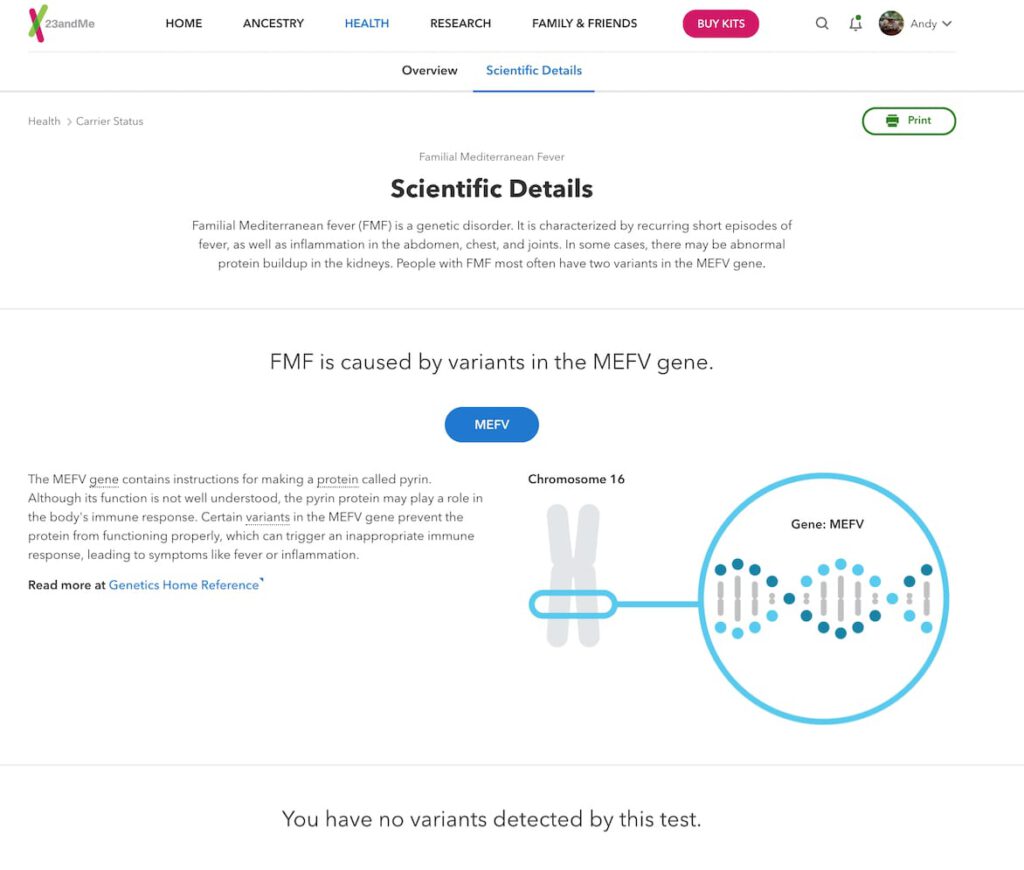This week 23andMe added a new Carrier Status report on familial Mediterranean fever, a genetic disorder that can include periodic fevers and inflammation in the abdomen, chest or joints.
The Familial Mediterranean Fever (FMF) Carrier Status* report provides information on whether a customer has at least one of seven variants in the MEFV gene. These are not the only variants associated with the condition. However, these are common variants associated with this disorder in people of Arab, Armenian, Sephardic Jewish, and Turkish descent.
More on Familial Mediterranean Fever
People with familial Mediterranean fever often have two variants in the MEFV gene, and the disorder often shows up in childhood. Beyond periodic fevers and inflammation, typical symptoms may also include skin rashes. In some cases, FMF can lead to an abnormal buildup of protein in the kidneys.
Among the treatments for FMF are anti-inflammatory drugs that can be used to manage episodes of fever. On some occasions, doctors prescribe drugs to prevent fever attacks and kidney damage, especially for people with the M694V variant.
 This new Carrier Status report doesn’t diagnose familial Mediterranean fever. Instead, it reports on whether a customer is a carrier for at least one of seven variants in the MEFV gene associated with a risk for FMF.
This new Carrier Status report doesn’t diagnose familial Mediterranean fever. Instead, it reports on whether a customer is a carrier for at least one of seven variants in the MEFV gene associated with a risk for FMF.
Carrier Detection Rate
What’s a Carrier Status* Report?
Carrier status tests are a type of genetic test used to find out if you carry a genetic change – or variant. For the types of conditions included in a carrier status test, having one genetic change – being a carrier – typically means you do not have that condition, but you could pass the variant on to your each of your children.Carrier status tests are typically offered for autosomal recessive conditions [or disorders]. For these conditions, a child needs to inherit a variant from both parents in order to have the condition. If both parents are carriers, each child has a one in four, or 25 percent, chance of being affected with the condition.
(It’s important to note that this also means that each child has a 75 percent chance of not being affected.)Autosomal recessive conditions for which carrier testing is commonly offered by healthcare providers include cystic fibrosis, Tay-Sachs disease, and sickle cell anemia, among many others.
The “carrier detection rate” for this report — which is the percentage of carriers of FMF who are expected to be identified by this test — is from 70 percent to more than 90 percent for people of Arab, Armenian, Sephardic Jewish, and Turkish descent.
The FMF report is the latest in a regular cadence of new health-related reports 23andMe offers Health+Ancestry Service customers, all of which meet FDA requirements. This brings the total number of Carrier Status* reports to 44.
23andMe also offers nine Genetic Health Risk* reports, eight Wellness reports on such things as Genetic Weight and Sleep Movement, and more than two dozen different trait reports.
As with other health-related reports, 23andMe has a tutorial that customers can go through before viewing their Familial Mediterranean Fever Carrier Status report. In addition to the tutorial, the report itself offers details on the condition, the specific variants tested for and the scientific information supporting the report. There are also links to information about genetic counseling and support group resources.
Note
*The 23andMe PGS test uses qualitative genotyping to detect select clinically relevant variants in the genomic DNA of adults from saliva for the purpose of reporting and interpreting genetic health risks and reporting carrier status. It is not intended to diagnose any disease. Your ethnicity may affect the relevance of each report and how your genetic health risk results are interpreted. Each genetic health risk report describes if a person has variants associated with a higher risk of developing a disease, but does not describe a person’s overall risk of developing the disease. The test is not intended to tell you anything about your current state of health, or to be used to make medical decisions, including whether or not you should take a medication, how much of a medication you should take, or determine any treatment. Our carrier status reports can be used to determine carrier status, but cannot determine if you have two copies of any genetic variant. These carrier reports are not intended to tell you anything about your risk for developing a disease in the future, the health of your fetus, or your newborn child’s risk of developing a particular disease later in life. For certain conditions, we provide a single report that includes information on both carrier status and genetic health risk. The Familial Mediterranean Fever Carrier Status Report is indicated for the detection of seven (7) variants in the MEFV gene and is most relevant for people of Arab, Armenian, Sephardic, Jewish, and Turkish descent. For important information and limitations regarding other genetic health risk reports and carrier status reports, visit https://www.23andme.com/test-info/.